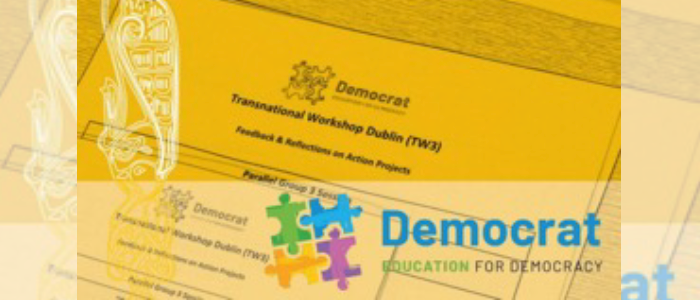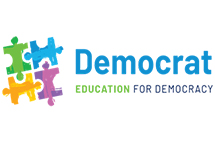Third DEMOCRAT transnational workshop: presentation of pilot projects for democratic education
The third transnational workshop of the DEMOCRAT project, organized by Dublin City University (DCU), was held in Dublin on 6 June. The workshop focused on the promotion of education for democracy through different innovative approaches. For this purpose, some of the local pilot projects developed within the 6 national DEMOCRAT living labs were presented. The presentation of these projects led to an interesting debate and exchange of ideas that will be used to improve the design of the projects.
The event started with a welcome speech by Professor Charlotte Holland, Vice-Dean of the DCU Institute of Education. The Irish team then presented the day’s agenda and the dynamics of the sessions.
The morning was structured in three parallel group sessions, each focusing on different aspects of education for democracy:
Group 1: Teacher Training and Environmental Education.
- Teacher Tranning: Emma Kostiainen, Saara Tujula and Matti Rautiainen from the University of Jyväskylä, Finland, discussed innovative methods in teacher education.
- No democracy without….: Piotr Walda from Poland presented the fundamental elements necessary for democracy.
- Environmental Delegates: Joan Martorell, from the Institut Dolors Mallafré in Vilanova i la Geltrú, emphasised the role of environmental education in promoting democratic values.
- Education that supports democracy: A video presentation from the University of Tallinn showed different perspectives on the integration of democratic principles in education.
Group 2: Literacy and Human Rights in Education
- Read Right- Read Rights: Claudia Soler, from Escola Carrilet in Palafrugell, highlighted literacy as a cornerstone of democratic engagement.
- Human Rights and Democracy: Olga Klotz, from Poland, presented on the intersection of human rights education and democratic participation.
- And the story is…: Graham Carroll and the Irish team discussed narrative techniques in teaching democracy.
- Example of project-based learning from Estonia: Maarja Hallik from Tallinn University shared a practical example of project-based learning that supports democratic education.
Group 3: Interdisciplinary Approaches to Democracy
- Interdisciplinary KAOS project: Gemma Saladrigues from the Institut de El Carme de Lleida explored interdisciplinary approaches to education for democracy.
- Participatory School Budgeting: Anna Dela from Poland discussed how participatory budgeting in schools can teach democratic processes.
- Empathy in action: Derek Cleary and the Irish team presented the importance of empathy in democratic education.
- Opinion line: Maarit Jõemägi from Estonia presented a platform for student opinions and democratic participation.
The afternoon was dedicated to refining projects that promote education for democracy. This session allowed for deeper discussions and refinement of ideas in order to improve their design and start implementation in the coming months. Afterwards, all participants gathered in the same room where the 12 participating pilot projects were presented. In addition to presenting their project, the possible challenges or areas for improvement that had been discussed during the group session were also discussed. In this way, the people who had been in another group during the morning were able to learn about the pilot projects of other groups and contribute ideas to these projects.
The day concluded with two interesting interventions by two experts. Firstly, Dr. Aidan Clifford related the projects to the Council of Europe’s Democratic Competence Framework. Then, Professor Amelia Lopes, international advisor of the DEMOCRAT project, shared her experience in civic education and educational reform in Portugal.
Tallinn Conference
On 27-28 February, the first conference of the DEMOCRAT project took place in Tallinn. This event provided a platform for academics, policy makers and practitioners to explore the crucial nexus between education and democracy. The two-day conference included interesting debates, research presentations and collaborative sessions aimed at exploring the challenges and opportunities of education for democratic citizenship today. You can read more about the conference in this article published on the project’s website. You can also watch the videos of the different sessions at the following link.
DEMOCRAT Agora
At the same time as the Tallinn Conference, the DEMOCRAT Agora was launched. The Agora is an interactive tool designed to broaden the participation of people interested in the project and in education for democracy with the intention of creating a small DEMOCRAT community. In this way, the Agora is intended to be a meeting place to broaden the debate with the educational community, with specialists and with all those interested in strengthening democracy through education. Currently there is Agora EU, which is the space for international participation and whose language is English, and Agora ES, which is the space for national participation and is available in Spanish and Catalan. Here you can consult different texts generated by the project such as external collaborations, publications by experts related to education for democracy or interviews with experts, project leaders or teachers where they explain their experiences and reflect on education for democracy.



Comments are closed.